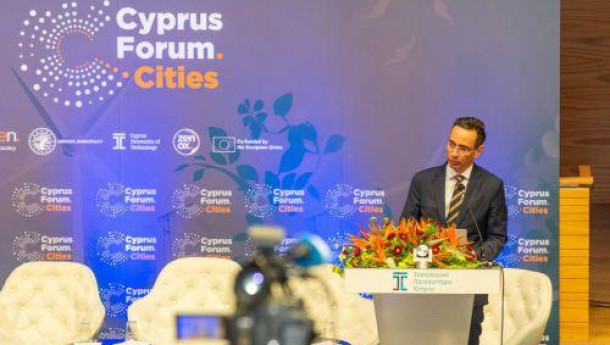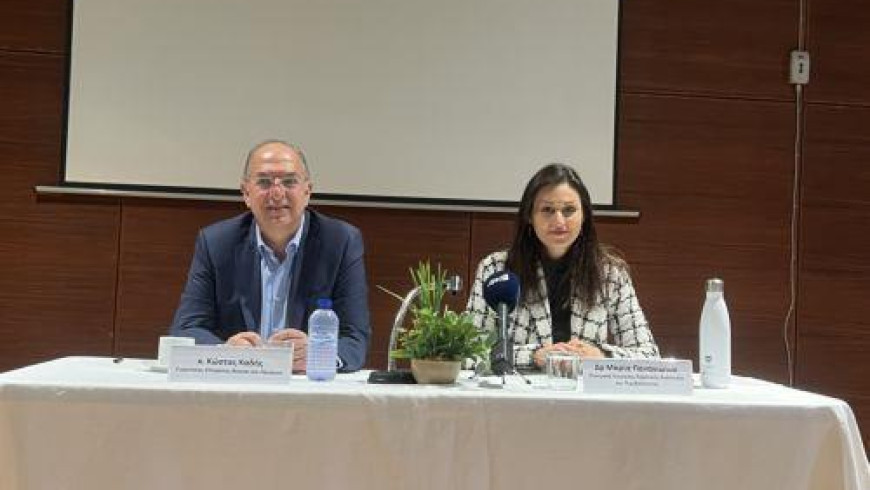
House of Representatives President Annita Demetriou warned on Friday about forthcoming challenges in local governance during her address at the 2nd Cyprus Forum Cities event. Additionally, Deputy Minister Nikodemos Damianou outlined the Cyprus government's plans for smart city development, including the Smart Cyprus initiative aimed at implementing holistic solutions across the country. Deputy Minister Irene Piki emphasised the critical role of cities in improving citizens' quality of life, highlighting various initiatives for sustainability and efficiency.
Local government is getting ready for a challenging time starting June 9 said President of the House of Representatives, stressing how important it is for both the executive and legislative powers to stay alert. She said laws must be amended to fix problems, especially with a big reform coming up after 25 to 30 years of talks.
Speaking at the 2nd Cyprus Forum Cities event on Friday, themed "Towards a Sustainable, Green, and Smart City of the Future," held in Limassol Annita Demetriou stressed the need for "collaboration and vigilance from all of us to genuinely support the reform," urging citizens to choose their representatives in the upcoming June 9th elections.
Demetriou warmly welcomed the hosting of the 2nd Cyprus Forum Cities, emphasizing the critical nature of these discussions, particularly now, "as we have just a few months to translate into reality a highly significant reform" following the election of local government representatives, which fundamentally, as she added, "alters the functioning of local governance, at least as it has operated in recent years."
Cyprus government focuses on smart city development, says Deputy Minister
Deputy Minister of Research, Innovation, and Digital Policy, Nikodemos Damianou, outlined the government's plans aimed at fostering conditions conducive to the transition towards smart cities.
Damianou highlighted Cyprus's current lack of the necessary technological infrastructure for the government, public sector, and business community to collectively build evolving ecosystems and solutions. He emphasised the need for a concerted effort to achieve this goal.
Central to these efforts is the Smart Cyprus initiative, which operates under the philosophy of Platform Economy. Damianou explained that Smart Cyprus aims to provide a unified, holistic approach to implementing smart city solutions across the entire Cypriot territory. This initiative will offer a technological infrastructure—a platform—where smart city solutions can progressively integrate.
The project, funded with €35 million from the National Recovery and Resilience Plan, is currently in the competitive tendering phase, with a deadline set for mid-May. It entails the installation and integration of at least 120,000 smart sensors.
Cyprus, he added, was the first European country to achieve 100% population coverage with 5G networks. Additionally, a significant project for the coverage of all rural and remote areas with optical fiber networks was recently announced, ensuring equal access to digital economy participation.
Damianou also said that the government's action plan for smart cities and investment in innovative technologies were part of a broader strategy to upgrade the country's digital infrastructure and modernise the state. He added that Cyprus aimed to become a pioneer in achieving 100% population coverage in high-speed connectivity spectrum, both mobile and fixed, by the end of 2025, thus fostering enhanced citizen-state interactions and transactions.
Cities play a vital role in improving the quality of life of citizens says Piki
Our cities, as centers of social and economic activity, play a vital role in improving the quality of life of citizens, the primary goal of our governance, Deputy Minister to the President Irene Piki said.
Piki praised the action of the Cyprus Forum Cities as an initiative of the youth of our country and a shining example of teamwork and participatory democracy.
The Deputy Minister referred to actions that are included in the 2024 annual planning and include ensuring affordable housing through innovative measures such as "rent and upgrade" and "build to rent", addressing traffic and promoting sustainable urban mobility with the creation of new "Park & Ride" areas and dedicated lanes for buses and bicycles, digital transformation by digitizing key services and implementing the Digital Citizen, and increasing urban greening.
She said that actions for a climate-neutral future are included in the National Action Plan for the Circular Economy, the pilot implementation of the Green Community, the penetration of RES projects through land and sea spatial planning, the implementation of sponsorship plans that strengthen energy upgrading of households and businesses such as "Photovoltaics for all", the strengthening of electric mobility through grant schemes for the purchase of electric and low-emission vehicles and the implementation of Pay as you throw (PAYT) from local authorities.
Piki also referred to the role of local authorities, pointing out that the reform gives increased powers to the authorities and the necessary tools, so that they are administratively and financially independent organizations, sustainable and efficient.
Commissioner for the Environment, Antonia Theodosiou, highlighted the Office's commitment to fostering sustainable and climate-neutral community clusters as a top priority. The initiative aims to assist these clusters on a pilot basis to transition towards environmentally friendly practices and resilience against climate change.
Theodosiou emphasized the implementation of green initiatives aligned with European directives, focusing on sustainable development, landscape and soil protection, nature restoration, and enhancing citizens' quality of life. Additionally, she said that the Commissioner's Office was actively working to promote the adoption of UNESCO Biosphere Reserve models in various regions.
The Forum was also addressed by President of the European Committee of Regions (CoR) Vasco Alves Cordeiro. In his televised address Cordeiro noted that as we face growing threats to democracy at all levels and divides across Europe's regions, it is of crucial importance to make the most of decentralization and ensure that local and regional authorities are well-funded, respected and power responsible and have sufficient manoeuvres to respond to concrete issues on the ground.
He reiterated CoR’s readiness to play its part, in areas such as achieving global targets for climate change, biodiversity and sustainable development and actively evolving local communities. “Mobility transition, improving people's quality of life by investing in public transportation infrastructure as well as promoting active mobility. Addressing the housing crisis, it is about time we ensure everyone has access to affordable and comfortable housing in Europe” he said.
Director-General for Regional and Urban Policy (REGIO) of the European Commission Themis Christophidou reminded that in Cyprus EU’s cohesion policy, has supported sustainable urban development strategies covering the urban centres of Nicosia, Limassol, Larnaca and Pafos, noting that for 2021-2027 the Commission supports projects led by 30 municipalities and communities of all sizes with 72 million euros of European investment benefiting more than half a million Cypriots.
At the same time she added that through the European urban initiative launched in 2022 with the budget of 450 million from the European Regional Development Fund (ERDF) the Commission offers opportunities and an environment for implementing strategies.
“Funded projects test new solutions, techniques and planning models, building capacities and sharing knowledge in the sustainable urban development” she noted, indicating that “this initiative takes its roots in our conviction that cities must be driving the design and implementation of policy responses to their local challenges”.














 3287.99
3287.99 1275.09
1275.09
